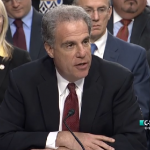Macron’s Christmas: Grabbing the Third Rail of French Politics
Things are not going well for Macron’s government in the run up to Christmas. Pensions are like that old saying about Social Security, they are the third rail of French politics. Former President Chirac tried to reform the pension system twice, and faced so much action in the street he had to mostly back down in both 1995 and 2003. Then Sarkozy tried again in 2010, without managing to reform much more than Chirac did. Marcon is not so much touching the third rail as tying his government to the substation at this point.
According to the government there are two reasons the pensions need to be reformed: firstly there are 42 different plans that need to be simplified and streamlined so that anyone, including the government, can understand them. The government has proposed making one plan for all. (Though this principle has already fallen to political expediency and keeping the police unions happy, and there are now more than one being proposed) Secondly, they’re doomed to run into the red by billions of euros, though there seems to be a lot of variation in how many billions of euros different people project.
The reasoning gets a little trickier than it might seem when you look closer. 42 pension plans is a lot, but they cover a broad swatch of work, from construction and firefighters to train drivers and accountants and computer programmers. Having one retirement age to cover both firefighting and computer programming doesn’t make much sense. A seventy-year-old can take up programming for the first time and find themselves productive and engaged, 40 years of firefighting breaks the human body.
As for the shortfall, it’s complicated. Much like the Social Security shortfall in America, it’s a bit of an accounting trick one way or the other. French workers pay into it, have paid into it, and will keep paying into it along with the rest of their considerable tax burden. There’s money, just not a lot of clarity on how to spend it. Any shortfall in pension funding represents somewhere else the government gets to spend, such as Macron’s love of cutting taxes to make France more business friendly, or revitalizing transit in remote areas, or paying nurses.
There’s no reason to believe Macron is eager to pay nurses, though he has been eager to get rid of wealth taxes. There’s also no reason to believe that the proposals are actually intended to address any shortfall — as the government has faced resistance it’s put the reforms out further into the future, and changed nothing about how Baby Boomers will retire, despite the Boomers being the source of retirement shortfalls all over the developed world. In fact, the proposal is so gradual the only people who would be fully affected by it are currently too young to vote.
Macron has said nothing recently about any of this. He’s made his prime minister, Édouard Philippe, the face of recent announcements, along with the minister appointed by the administration to manage pension reform, Jean-Paul Delevoye. Phillippe has been somewhat damaged in public view, but Delevoye, an old Chirac minister who turned En Marche! at the moment when it became politically expedient for everyone to turn En Marche! in 2017, had to leave office after several newspapers reported that he had illegal conflicting contracts with his role as pension minister. He has not been replaced as of this writing. Lines for political suicide are often short. How this week goes will probably also determine the fate of Philippe.
On a side note, never join a political party that has an exclamation point in its name.
Macron’s neoliberalism seems to be descending into a kind of absurd nihilism where nothing gets cheaper for the government, but also no one has as much as they used to. (Trust it to the French to make something as boring as national budgeting into a screaming abyss of nihilism into which seemingly endless passion is poured from the streets of Paris.) His government has no trust with most people, and even when En Marche! supporters speak out, it’s often with disdain towards the majority of their fellow French people. Most often I have heard that they’re lazy and want everything to be given to them.
But the French are not very good at lazy. Private company workers have struggled through terrible traffic to get to work during the strike. Bike use has spiked. The protestors and strikers have taken streets, blocked fuel depots and bus depots. Transport strikers are being joined by schools, libraries, museums, and as of today, trash collectors. To restate my constant refrain, the French have nice things because they take them, but that’s never easy or simple. The country is paralyzed, and right now neither side seems inclined to blink.
My work for Emptywheel is supported by my wonderful patrons on Patreon. You can find out more, and support my work, at Patreon.






Call me crazy, but perhaps if governments started taxing the corporations and the wealthy at a more aggressive rate, perhaps the outrageous imbalances in Inequality would begin to help society as a whole.
Our world cannot sustain a global economic system where the only people who matter are the One Percenters.
I find it a shame that workers give their service for years, only to have their pensions threatened AFTER they’ve given their useful work lives.
Far too little is being done to remedy inequality around the globe. I am totally surprised more workers, unions, everyday John & Jane, aren’t rising up with their pitch forks, though my hats go off to the “Yellow Vests” who took to the streets.
Honestly I’m very confused by the neoliberal consensus. I just don’t understand what kind of world they want to live in and why, and why they think it will make them happy. Sometime they remind me of the bad guy in the 5th Element.
One of my favorite films. A little bit cheesy and over the top. But quite enjoyable. Plus it has Mila Jovovich in it!
;)
Global Warming. Loss of ecologies affecting our ability to sustain our planet.
Inequality – Inability to ensure equity among peoples in an economy.
Put them both together…I think we are headed for Soylent Green.
There’s no way we survive this, IMHO. If the democrats don’t take the presidency, house, and the senate, I don’t know how we ever get to the point of implementing real policies that will help us as a Nation and as a People (including those around the globe) literally survive.
Our times call for herculean efforts to make reforms if we are to survive.
Unfortunately, with gridlock, tribalism, and hatred gone wild, I don’t think there’s any chance Reasonable Representatives get elected to help lead and drive the critical policy changes that are long-overdue and critically needed.
It is sometimes difficult for Americans to understand French politics. I don’t claim to. I’ve been living in Paris 15 years and here is what I’ve learned. Workers here have rights, are protected and have power. It’s heartening to see and it’s discouraging to see how the opposite seems to be the case in the US. On the other hand, many of the French labor laws, work rules and union activity are self-defeating, even ridiculous . Famously, it is difficult (and can be expensive) to fire someone here once they are on a permanent contract, even if they are flagrantly irresponsible or incompetent. Therefore, companies are reluctant to hire new people or expand and do so very, very carefully and slowly. They don’t have the flexibility to grow quickly in response to an opportunity or retrench in a downturn.
The cost to a company for a worker is almost 150% of the worker’s salary, because the company pays 50% in social taxes on top of the salary which is also taxed. However, keep in mind that for the worker this covers medical (and it IS good…I am on the French system.), disability, generous unemployment, generous vacation time, training and retraining and usually a generous pension. (I may have forgotten something). Everyone more or less knows that all of this is unsustainable (because of an ageing population and shrinking number of births, for starters), but no one wants to be the one that changes. The French seem to want things to happen immediately. They elect a government that promises change and then turn sour when they don’t see immediate results. I’m not smart enough to know how any political leader can manage the conflicts in the system. And, of course, there is the Front National waiting to exploit the discontent but with no real solutions of their own, unless you think blaming immigrants is the answer. Tough times, these.
“Everyone more or less knows that all of this is unsustainable … but no one wants to be the one that changes”
Bingo. Every group fears being hung out to dry if reforms start and stall, so understandably no one will agree to play ball and take the first step.
There are some legacy imbalances in retirement age. For example, railway workers (les cheminots) used to have dangerous and taxing jobs – shoveling coal, etc. Not so much anymore, but as far as I know they still get early retirement.
My father-in-law was a harbor pilot who retired at age 55. But the job had a significant element of danger, going out to meet cargo ships and oil tankers to guide into port. More than one of his colleagues got pinched between the small launch and the hull of the ship while trying to grab a rope ladder and transfer in rough seas. Perhaps some ports use helicopters these days.
The French speak of “Les Trente Glorieuses”, i.e. the thirty relatively affluent boom years after WWII. A lot of the current benefits got baked into the economy then, but they are indeed not sustainable across the board.
Nice comment. Those thirty years were glorious in the US, too, for white middle class Americans. Corporate America put a stop to them.
The French pension systems may need reforming, but like the American Constitution, who will do it and to what end without seriously compromising the interests of the many?
Across-the-board simplification, not tailored to vastly different circumstances, would harm many. Enforced commonality would be wrong for the same reason. Delaying retirement would be wrong for many, by taking away already earned deferred compensation. I don’t get the sense that Macron’s vague policies take any of that into account.
Roughly the same in France, I think: while some Italian and Portuguese and Eastern European immigrants fared well enough in the long run (typically by working harder in the building trades and other “menial” jobs), in the conventional wisdom it was “les francais de bonne souche” (good origin, good genetic stock – i,e, native-born, white and Catholic) who “deserved” the fruits of the boom years.
Things got more complicated with the influx of pieds-noirs and Harkis (Algerian Muslims who supported French Algeria during the war)… and immigration from the rest of post-colonial francophone Africa.
During those thirty years in America, public employment was where ambition supposedly went to die. Modest work and career prospects, modest pay, the latter balanced by good health and retirement benefits and job security. The private sector offered better pay and benefits, better career advancement, harder work and less job security.
Today, the right screams about public sector unions and their “gold-plated benefits.” It wants them gutted, in part, because it just hates unions. The reality is that public sector pay and benefits have largely remained the same. It is private employers who have crammed down pay, gutted job security, and discarded pensions and other benefits, to the point where once modest jobs now look mahvelus. Even a dandelion looks glorious when it’s in a desert.